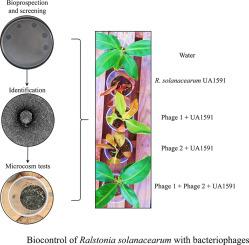当前位置:
X-MOL 学术
›
Biol. Control
›
论文详情
Our official English website, www.x-mol.net, welcomes your
feedback! (Note: you will need to create a separate account there.)
Bacteriophages as promising agents for the biological control of moko disease (Ralstonia solanacearum) of banana
Biological Control ( IF 3.7 ) Pub Date : 2020-10-01 , DOI: 10.1016/j.biocontrol.2020.104238 María Ramírez , Benjamin W. Neuman , Camilo A. Ramírez
Biological Control ( IF 3.7 ) Pub Date : 2020-10-01 , DOI: 10.1016/j.biocontrol.2020.104238 María Ramírez , Benjamin W. Neuman , Camilo A. Ramírez

|
Abstract “Moko disease”, caused by the bacterium Ralstonia solanacearum, is one of the most devastating diseases of banana and plantain. Its management is difficult, given its aggressiveness and easy dispersion, as well as the lack of products for its control. Effectiveness of antibiotics is quite low and their use in the field is restricticted, given environmental and human health concerns. Bacteriophages (phages) have emerged as an alternative for the control of bacterial plant diseases, but their potential for the control of Moko is yet to be tested. Thus, in this study, phages isolated from soils cultivated with banana and plantain were selected and evaluated for their capacity to control R. solanacearum, both in vitro and on banana plants under greenhouse conditions. For this, eight lytic phages were isolated from soil collected in plantations of banana and plantain in Colombia and tested against 65 native strains of R. solanacearum. The two most effective phages were further evaluated for their capacity to inhibit the growth in vitro and in a soil microcosm of a highly pathogenic strain, R. solanacearum UA1591. Here, both phages reduced the growth of the pathogen in liquid media and soil microcosm to levels that were below the threshold of detection in 24 h. Lastly, in a greenhouse experiment, plants treated with the two-phage cocktail were 100% protected from Moko, even though most plants treated with individual phages still displayed symptoms of the disease. These results support that two-phage cocktails are promising biological control agents against Moko disease.
中文翻译:

噬菌体是生物防治香蕉莫科病(青枯病菌)的有前途的药剂
摘要 由青枯病菌引起的“莫科病”是香蕉和大蕉最具破坏性的病害之一。鉴于其侵略性和易分散性,以及缺乏可控制的产品,它的管理很困难。考虑到环境和人类健康问题,抗生素的有效性非常低,并且它们在该领域的使用受到限制。噬菌体(噬菌体)已成为控制细菌性植物病害的替代方法,但它们控制 Moko 的潜力尚待测试。因此,在本研究中,选择了从香蕉和大蕉栽培的土壤中分离的噬菌体,并评估了它们在温室条件下在体外和香蕉植株上控制青枯菌的能力。为了这,从哥伦比亚香蕉和车前草种植园收集的土壤中分离出 8 种裂解噬菌体,并针对 65 种青枯病菌的天然菌株进行了测试。进一步评估了两种最有效的噬菌体抑制高致病性菌株青枯菌 UA1591 在体外和土壤微观中生长的能力。在这里,两种噬菌体都将液体介质和土壤微观中病原体的生长降低到低于 24 小时检测阈值的水平。最后,在温室实验中,用双噬菌体混合物处理的植物 100% 免受 Moko 的影响,尽管大多数用单个噬菌体处理的植物仍然表现出疾病症状。这些结果支持双噬菌体混合物是对抗 Moko 病的有前途的生物控制剂。
更新日期:2020-10-01
中文翻译:

噬菌体是生物防治香蕉莫科病(青枯病菌)的有前途的药剂
摘要 由青枯病菌引起的“莫科病”是香蕉和大蕉最具破坏性的病害之一。鉴于其侵略性和易分散性,以及缺乏可控制的产品,它的管理很困难。考虑到环境和人类健康问题,抗生素的有效性非常低,并且它们在该领域的使用受到限制。噬菌体(噬菌体)已成为控制细菌性植物病害的替代方法,但它们控制 Moko 的潜力尚待测试。因此,在本研究中,选择了从香蕉和大蕉栽培的土壤中分离的噬菌体,并评估了它们在温室条件下在体外和香蕉植株上控制青枯菌的能力。为了这,从哥伦比亚香蕉和车前草种植园收集的土壤中分离出 8 种裂解噬菌体,并针对 65 种青枯病菌的天然菌株进行了测试。进一步评估了两种最有效的噬菌体抑制高致病性菌株青枯菌 UA1591 在体外和土壤微观中生长的能力。在这里,两种噬菌体都将液体介质和土壤微观中病原体的生长降低到低于 24 小时检测阈值的水平。最后,在温室实验中,用双噬菌体混合物处理的植物 100% 免受 Moko 的影响,尽管大多数用单个噬菌体处理的植物仍然表现出疾病症状。这些结果支持双噬菌体混合物是对抗 Moko 病的有前途的生物控制剂。











































 京公网安备 11010802027423号
京公网安备 11010802027423号